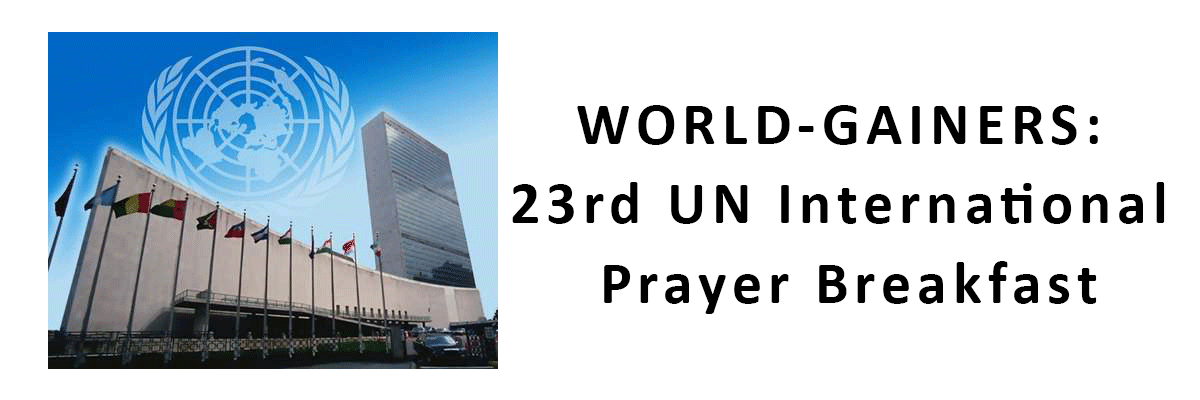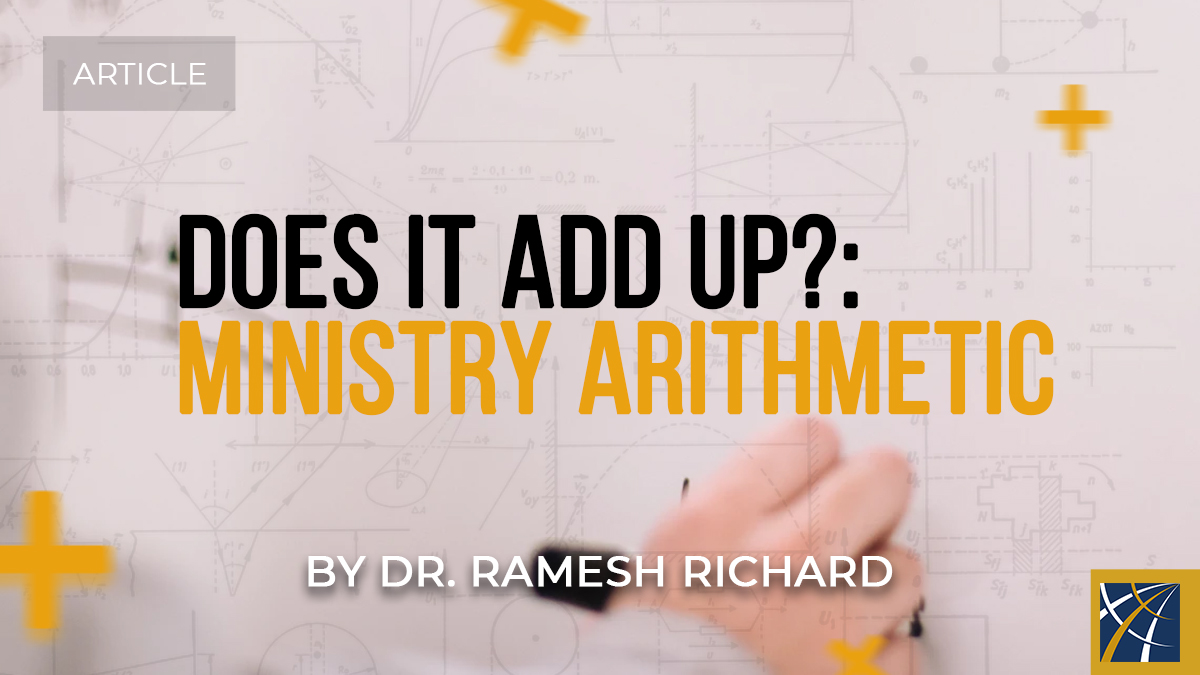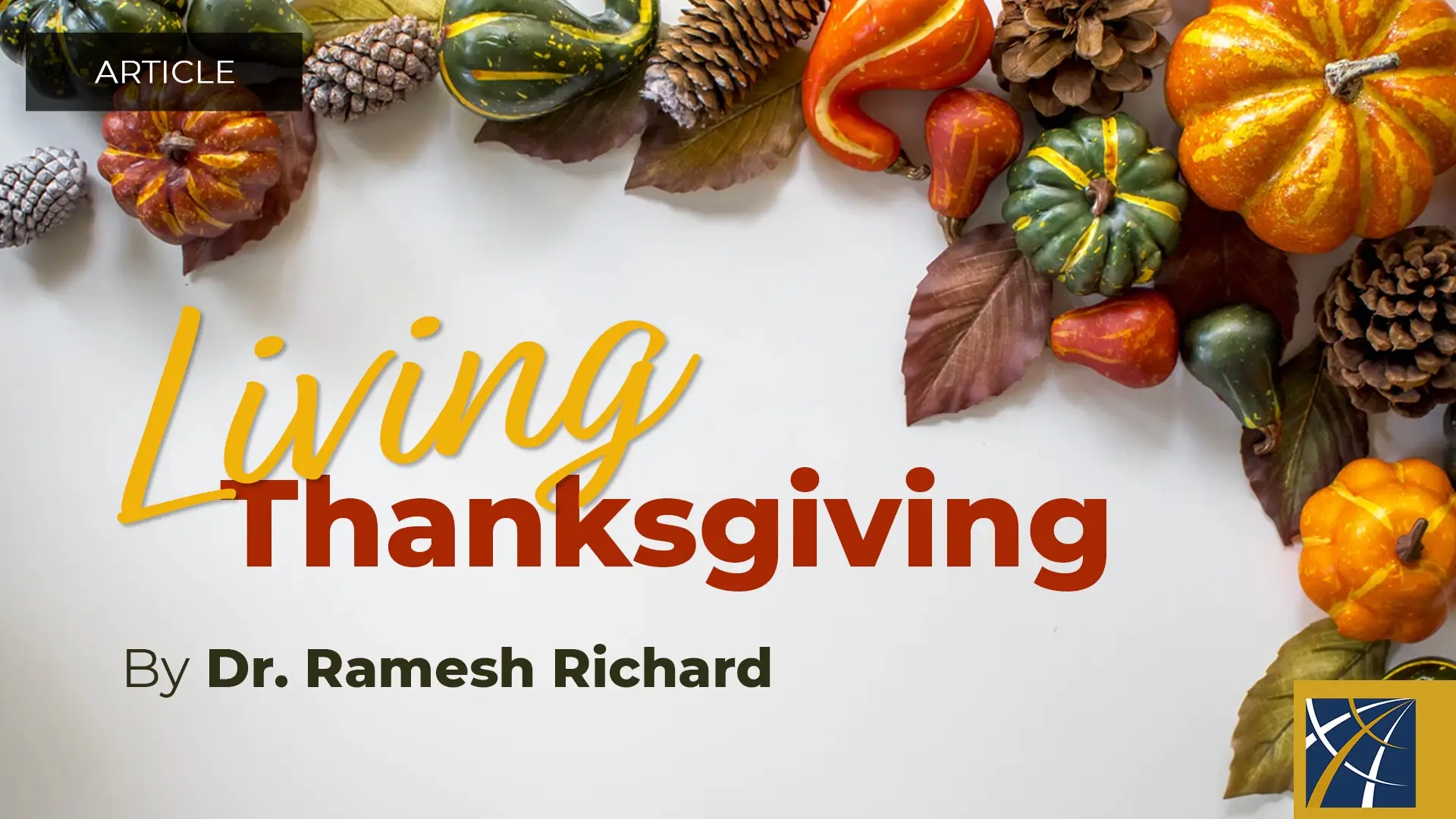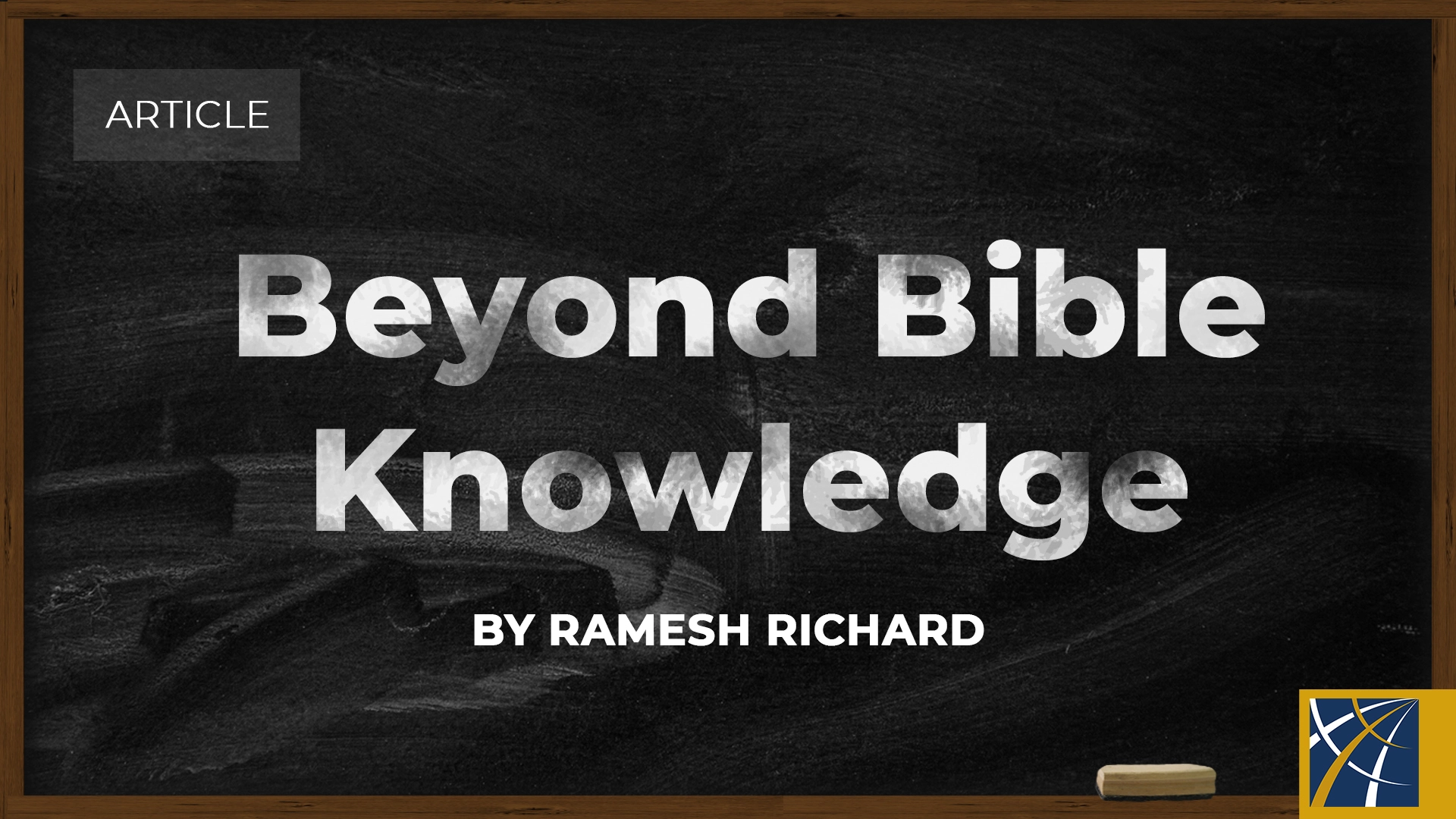New York, New York
by Ramesh Richard PhD, ThD
Greetings & good morning! I am pleased and privileged for this opportunity of audience with you—distinguished leaders, who represent your nations on the global stage, and with special recognition to our host, His Excellency, President of the UN General Assembly, as well as His Excellency, Secretary General of the United Nations.
This event, an International Prayer Breakfast, places niche stewardship responsibilities upon me, in addressing this august body of the world’s leaders. We watch you from afar; we are grateful for your perspectives; we do not envy you in the mix of the complexity of global realities and local pressures. We thank you for your service to your countries of origin, as well as to your Heads of State, so that this sometimes amazing world, and oftentimes demanding world of human beings can better get along in accordance with the Principles of the UN Charter, and especially at this 60th Anniversary year of the Universal Declaration of Human Rights. Each time I see the phrase Millennium Development Goals, or the Blue Helmets of UN peace-keeping forces, my spirit is unleashed to address leaders of communities, cities, countries, and continents with hopes for global peace and security—the cry of every human heart.
I am also grateful for the tireless committee that has worked quietly to reach out to you and bring each of you to this annual event—an event that functions as a tradition for spiritual orientation as you launch into another year of deep dialogues with broad desires for each country and the world. I am honored to be invited to address each of you this September morning in the grand, global city of New York—a microcosm of the world, which you represent in visible and articulate ways.
In keeping with the objectives of this annual breakfast, I would like to probe beyond national and social, historical and geographical, global and local concerns to personal and spiritual matters which claim every one of us regardless of race, place, or face. Being introduced as a spiritual philosopher carries its own complications. To modify the much misattributed quote, “A philosopher is like a blind man in dark room looking for a black cat that is not there,” “a spiritual philosopher, corrects the quote—for a black cat can always find the philosopher,” and perhaps, it is a blind man in a dark room looking for a black hat that is not there,” and the theologian helps him find the hat that is not there too!
My topic today is hopefully appropriate to this audience: World-Gainers. Not world-beaters, for that’s too competitive a phrase, better suited to the incredible Olympics that we have just experienced; but world-gaining as a metaphor for individuals who also make up these United Nations. For in many ways, you as individuals make up the body-corporate, and your personal spirituality contributes to strengthening the only true, global organization that exists for these times of human history and these places of human geography.
Actually, I have coined this hyphenated phrase, world-gaining, but borrow it from a most powerful question, a profound question, a purposeful question that encourages each one of us at this very moment, to leave everything that should be outside, outside; leave everything which is behind, behind, for a few minutes.
Here’s the simple, profound question—a question that may be written on the notebook of your heart, or your mind, or even a piece of paper: “If a person man gains the whole world and loses his own life forever, has it been a well-lived life at all?” “What does it profit a man, if he gains the whole world and loses his own soul forever?” What does it really profit a person to be a World-Gainer, but a Soul-Loser?
I examine this topic and ground my speech in a question for a couple of reasons:
A question implies we are all learners and seekers: I come as a fellow-learner. I do not come to you as life’s answer-man, but as a fellow-learner. I don’t know all the answers, nor do I offer myself as the answer. If I did, I would be God himself. I am like you, a learner, and I invite you to join me in the search for the key to the rest of your life, now, and forever.
And secondly, as a fellow-questioner, a fellow-learner, a fellow-seeker and finder, I could serve as a pointer in the journey of life. I come as fellow-seeker, yes, even a fellow-beggar sharing with others who it was who gave me bread, the bread of life.
Back then to the controlling question of our talk: What does it profit a person to be a World-Gainer and a Soul-Loser? Has the person who has gained the whole world and lost his soul for eternity experienced net-gain or net-loss?
As you can see the profoundly simple question comes in two parts—(1) world-gaining; and (2) soul-losing. Let’s look at each part.
- This World-Gainer has gained the whole world—not just a part of the world, but the whole world.
Ask the man on the street and he will talk about this person rather easily. The World-Gainer fits what sociologists call the PMF Index, made up of power, money, or fame. Sociologists go on to tell us that those three factors express a “strain to consistency.” Usually, those who are powerful are also rich and famous; those who are rich are also powerful and famous; those who are famous are also powerful and rich.
Let’s look for a moment at a person who is truly a World-Gainer. As one who is famous, he is on the cover of today’s newspaper and yesterday’s business magazine and tomorrow’s television headlines. He is a true celebrity, whose face is flashed on every magazine and television show in every language and in every country. The whole world is a-buzz about him, in awe. He is bigger than those whom you represent; more powerful than your President, Prime Minister, or Prince; and better known than the movie and music stars.
He has gained the whole world.
As one who is rich, he is richer than computer geniuses, real estate magnates, and media moghuls. He has all of the over $300 trillion worth of economic wealth in the world. The list of wealthiest people in the world is reduced to one person. Remember, he has gained the whole world.
As powerful, he exerts more power than all of the Heads of State, Secretaries of State, and Ambassadors of State, put together. He commands the world with power—all 239 or 240 governments, and the nearly 200 nation-states represented here; he sits on all corporate boards, and is the key to all institutional vitality.
This World-Gainer has gained the whole world—all there is humanly possible to gain! That is, the sum total of all power, all money, all fame—obviously a hyperbolic exaggeration of this person’s accomplishment to get the point across.
This person has gained the whole world. Not just part of the world, like you and I have. He has gained the whole world.
I don’t know anyone like that, though I know some very wealthy, famous, and powerful people. This particular person is exceptional. He has arrived on the top rung of the ladder of success, “only,” as some one remarked, “to find it leaning against the wrong wall.” After seeking the pot of gold at the rainbow; he found the pot of gold, but lost the rainbow.
The second part of the probing question heightens the spiritual tension in us.
- The World-Gainer becomes a Soul-Loser. He is gaining all there is to gain, but then losing all there is to lose when he loses his own soul. The most successful person in the whole world becomes the worst failure in the whole world when he loses his own soul.
A person’s soul not only refers to his natural life, but also to his true self, the essence of who he is, that will live past this earthly life to gain or ruin. It stands for a person’s eternal life.
The World-Gainer experiences two kinds of soul losses—ongoing immediate loss and a final eternal loss. He is subjected to ongoing immediate losses—for our headline question uses the present tense. While he is gaining the whole world (right now), he is losing his own soul (right now)! A real-time world-gain, and a real-time soul-loss; a simultaneous gain of the world, and loss of his soul.
May I share five immediate losses you will experience if you pursue gaining the world at the expense of your soul?
Sociological loss of Relationships—The PMF definition of world -gaining stratifies humanity. The drive to success if defined materially, will cause you to put things above human beings; prestige above people. You will seek to form your self-identity at someone else’s expense.
Existential loss of Stability—We pursue world-gaining in order to find a semblance of stability in a precarious world, in conflicted living. We pursue anything—good and bad stabilizers—to steady out our change-filled lives:
Power, Fame, Pleasure, Education, Government, Religion, Philosophy, Drugs, Addictions, Alcohol, Love, Sex, Possessions, Hobbies, Buying stuff, Selling stuff, New Stuff, Technology, Relationships, Stock Market, Work, Business, Gold, Appearance, Clothes, Influence, Contacts, Bribes, Corruption, Crime, Violence, Sports, Athletics, People, Marriage, Children, Parents, Physique, Beauty, Body, Intellect, Mind, Money, Friendship, Service, Food, etc.
However, none of these alternates can provide you with existential stability. They are not meant to function that way! Only God can provide that kind of steadiness.
Philosophical loss of Purpose—World-gaining can give you purpose in existence, but not the purpose of existence. Humans need personal purpose: an interior integration, a mental coherence, a reliable worldview, or we lose our humanity, our selfhood. We become like the mere brutes which live by instinct and whim.
Your pursuit in world-gaining actually reveals the “restlessness paradox.” You are restless when you haven’t gained the world; and yet restless when you do gain the world. So you need an overarching, legitimate purpose. If you don’t have purpose, you will die. As genocide survivor Victor Frankl, the philosopher of meaning noted, “you can put up with any what, as long as you have a why.” You can even put up with world-gaining, as long as you possess an adequate and sufficient purpose.
Ethical loss of Principle—“All roads lead to God!” believe some; “All roads lead to Rome” said others. The new conviction is of course: “All roads lead to money.” If all roads lead to money, wrong roads will be pursued for the sake of money. World-gaining clouds the eye of the mind, but worse, it confuses the heart. Your ethic becomes expedient and your morality turns relative because you want to maintain the gain of the world at all costs.
Spiritual loss of Priority—A psychologist and business leader writes: “If spiraling success is the only incentive guiding their lives, people will be easily ruled by obsessions. Sometimes, when individuals become consumed by spiraling, unidimensional successes, the things that matter most receive the least attention.” Things that matter most–like matters of the heart; relationships; long-term issues; even after-life questions receive the least attention in the middle of world-gaining and soul-losing.
Let me ask:
- Is the temporary as important as the permanent?
- Is the external as important as the internal?
- Is the physical as important as the spiritual?
- Is the circumstantial as important as the eternal?
If you said, “yes” to any of the above questions, beware of a soul-loss that has already begun. Beyond those five immediate losses of the soul is the worst one yet: an ultimate loss.
Eternal loss of Life—We can recover from immediate losses quite well. In fact I am going to reveal to you how you can recover from the immediate losses of having pursued world-gaining alone; but the greater loss is eternal loss from which we can never recover.
Eternal loss of every thing that has been gained, for every thing that we have gained and enjoyed will have to be left behind.
Eternal loss of one’s soul—one’s very life. Eternal loss is more than leaving everything behind; it’s losing one’s soul for eternity, forever. That’s why our banner question causes thoughtful reflection: “What does it profit, what does it really matter? What eternal benefit is there? What permanent profit do you see, that you gain the whole world and lose your soul?
Let me conclude with four simple and quick remarks on our “Question” strategy:
First, the form of a question: Anything presented in a question form causes you to at least choose between a “yes” and a “no” response. That is, you can’t answer “yes” and “no” to the same question at the same time. You can’t say “yes, there is profit in gaining the world and losing your soul” and “no, there is no profit in gaining the world and losing your soul.”
Questions don’t let you off easily. They will protect and prevent you from any kind of mental maneuvering, philosophical finagling, and cognitive gaming. You must answer in the affirmative or negative: “do you profit if you gain the whole world and lose your own soul?”
Second, the function of a question: Good questions create reflection. They provide a pause in the middle of life’s busyness. They give you reason to consider something more deeply. We have done that already—paused and considered the issue of gain and loss.
Third, the force of a question: Thoughtful questions also generate decisions, pushing you beyond opinion-making, to personal action. Such questions corner you into a decision, an honest decision accompanied by action. They compel you to make a choice.
Similarly, you too have to make a personal decision—you simply live life according to the choices you make, and just by living, you are making decisions, even if they are not conscious decisions. In this case, it’s a personal decision with perpetual consequences.
Fourth, the focus of the “success” question: The force of the question is toward you, but the focus of the question is not toward you. When the questioner asked, “is it profitable for a person to gain the whole world, but lose his soul,” some thing far more subtle was being proposed.
What you may not know about this intrusive question, is that it is posed to humanity by Jesus, the Lord Jesus Christ. What He means is that “there is no profit at all in world-gain and soul-loss. “
What is more significant about the question is that the questioner invites those who want to gain life and not lose it, to consider him as the answer to his question.
What good, what benefit, what profit is there in gaining the whole world and losing eternal life?
In life, we find different kinds of question-askers:
Ordinary question-askers merely seek information, seek answers to relevant questions.
Another kind of question-asker is the wise person among us—a teacher, a prophet, a philosopher, a guru, a leader, even a patient parent. When a wise person asks you a question, he wants to point you to an answer. That’s the role I am playing today, pointing you toward an answer.
The final kind of question-askers are not just ordinary human beings, nor merely wise teachers. This third kind of question-askers carry deity status. God as you know, should not seek information from us; and should not be pointing to some one else as an answer. God needs to offer himself as the answer to the questions He asks of you, and any question you may ask of Him.
That’s what the Lord Jesus does, when he asks, “What good, what benefit, what profit is there in gaining the whole world and losing eternal life?” He is offering himself as your answer to the question: “You take my offer of eternal life. You experience world-gaining—for we are all somewhere on the spectrum of success, but not at the expense of people, permanence, purpose, principles, and priorities. Most importantly, you will gain eternal life; you will not lose your soul eternally.”
You can have the very life of God in you, one not affected by any outward circumstance. You can also gain your soul, by welcoming the Question-Asker the Lord Jesus Christ into your life. And in the context of his question, Jesus refers to Himself as the Chosen Savior of humanity. You may know why. He predicted that He would take on sin’s penalty for all humanity by his death; and after three days rise again to qualify as The Answer to His Question. He said He would come back to receive an account of our lives any time. He therefore invites us to embrace Him, to exchange our own versions of life, for His full and eternal life.
I taught my children to play chess. As my son captured pawn after pawn, he was thrilled. He would take two of my pawns and I’d capture his queen. I would exchange a pawn for his knight. Then he’d take two more pawns while sacrificing his bishop or castle. In terms of sheer number, he had 6 of my men, and I had only three. Soon his king would be in trouble, under check. Why? While he had more chess men of mine in sheer numbers, I was seeking for positional advantage. Material advantage is not the same as positional advantage. When you pursue the gaining of the world at the expense of your soul, you will soon be under check, choked, and have to concede loss. But if you welcome the offer of God Himself by acknowledging the Lord Jesus Christ as the only one who can give you eternal life, you would have gained your soul, regardless of how much of the world you would have gained.
World-Gainers can be Soul-Gainers as well. I wish you, ladies and gentlemen, esteemed leaders of the world, the very best for life, family and work from now on. I look forward to hearing from you at the private and secure website below for additional interaction and comments. Thank you very much.
2008 © Ramesh Richard. Unlimited and true copies may be made for free distribution. Please contact www.rameshrichard.com for additional comments or questions.






